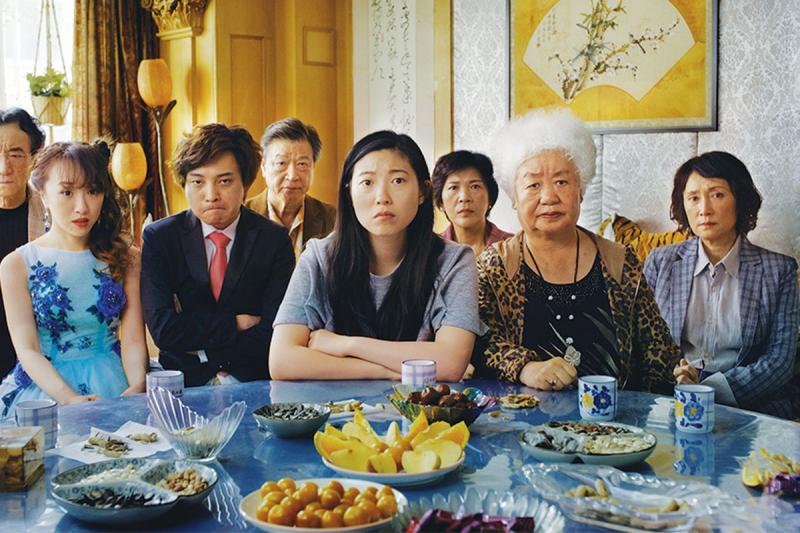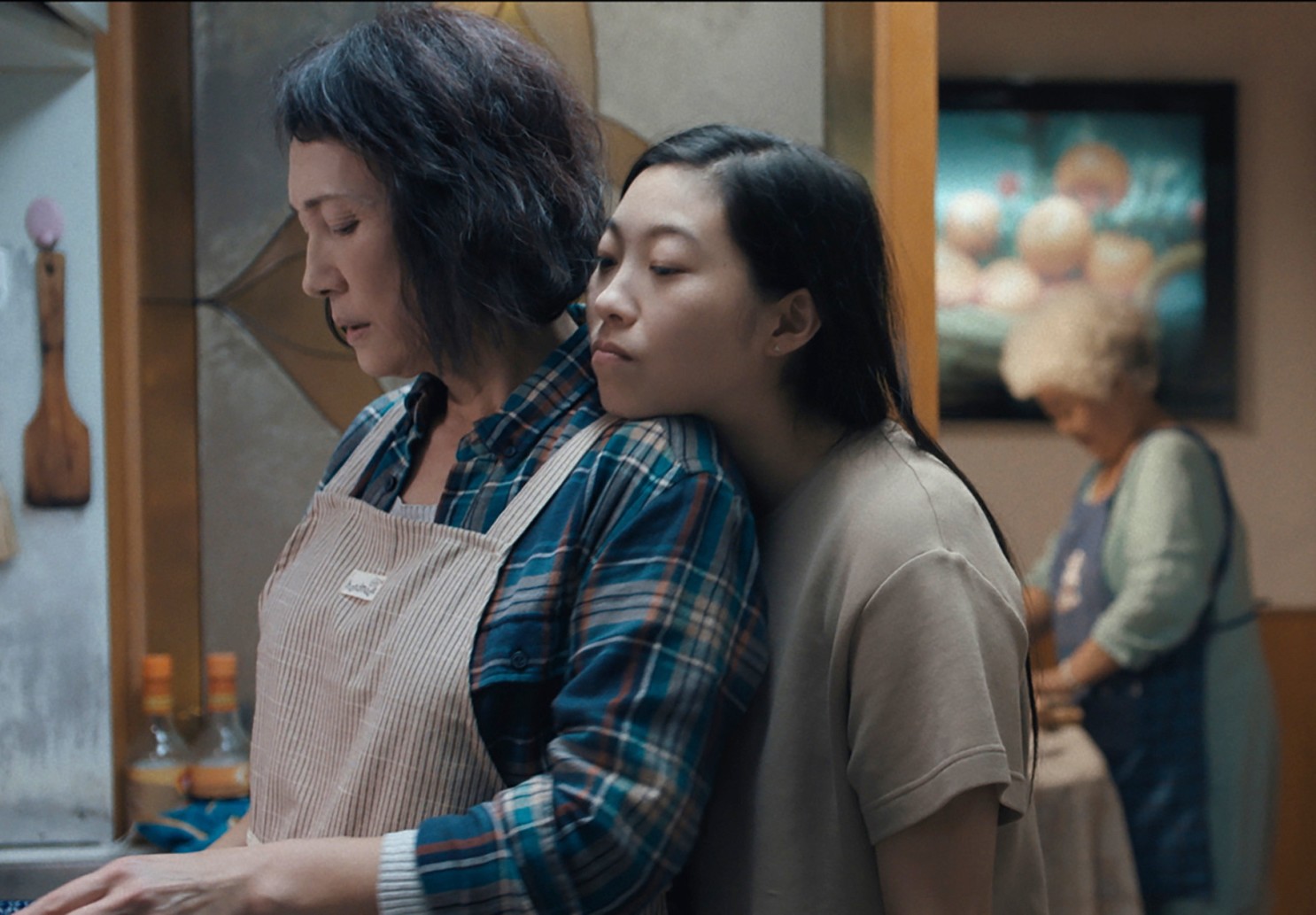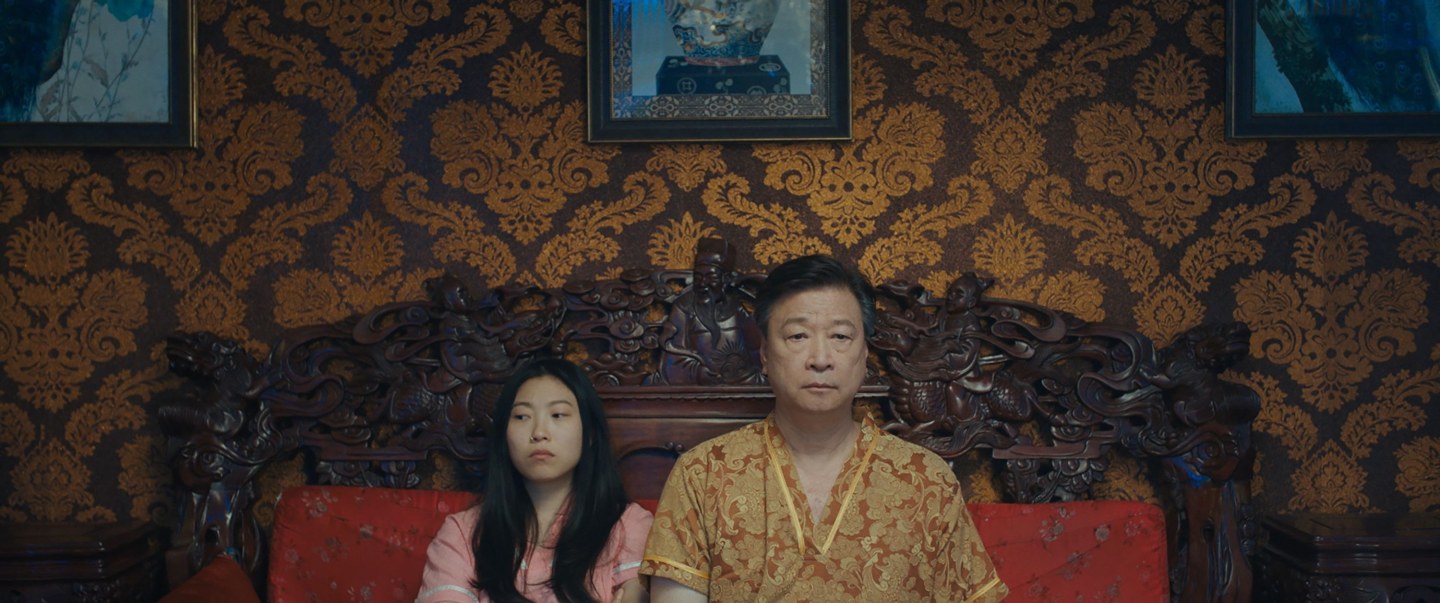The Farewell review - warmly comic culture-clash | reviews, news & interviews
The Farewell review - warmly comic culture-clash
The Farewell review - warmly comic culture-clash
Deathbed deceit causes Chinese-American confusion in a sly memoir

The cancer weepie is knocked off its tear-jerking axis by Lulu Wang’s sly and heartfelt autobiographical tale.
Billi (rapper-actor Awkwafina) is Wang’s alter ego, a 30-year-old, Chinese-American scuffling writer, who we first see on the phone telling relentless, reassuring white lies about her New York life to her Nai Nai (grandmother) in China. Before long, Billi is back in Changchun, the home city she left as a child, where the family have gathered on the pretext of a lavish wedding to say surreptitious farewell to their unsuspecting nan.
The fit between fiction and fact is tight enough for Wang’s great-aunt to play Billi’s great-aunt. Wang’s camera looks with wide-eyed fascination at violently anonymous skyscrapers, a necropolis of identical graves where half-remembered rituals are enacted, and the largely erased neighbourhood where she grew up. Awkwafina meanwhile makes Billi her own creation, rangy but slump-shouldered, with a good heart and gawky grin.
 The character actors gathered around her reinforce the comic family dynamic, as tragically long faces belie their reunion’s supposedly joyous intent. Diana Lin (pictured above with Awkwafina) is especially relishable as Billi’s caustic mum, whose determination not to put her “emotion on display like in the zoo” leaves her features tight with dismay. Professional weepers meanwhile simulate feelings at a funeral, as pretence and contradictions abound.
The character actors gathered around her reinforce the comic family dynamic, as tragically long faces belie their reunion’s supposedly joyous intent. Diana Lin (pictured above with Awkwafina) is especially relishable as Billi’s caustic mum, whose determination not to put her “emotion on display like in the zoo” leaves her features tight with dismay. Professional weepers meanwhile simulate feelings at a funeral, as pretence and contradictions abound.
Veteran Chinese star Zhao Shuzhen plays Nai Nai, bluntly tough if oblivious to her fate, typically matchmaking Billi with a UK-educated doctor as the pair discuss her diagnosis in English above her head. She does offer life wisdom to her beloved granddaughter, as Billi not only wrestles with future loss, but realises the roots she was torn from. Her submission to Chinese values, where the individual matters less than the whole, ends her assumption that openness is all, instead accepting her uncle’s explanation that “it’s our duty to carry the emotional burden” for Nai Nai. The Farewell is very much a Chinese-American film, shaped but not swallowed by Hollywood norms. Repression for the greater good isn’t the studios’ usual happy ending.
 A wedding reception that’s secretly a wake takes verité shape, with sozzled, reflective lulls and maudlin singalongs. Everything seems a performance, as the cast become a dutiful audience to Billi’s memory monologues, and widescreen vistas resemble a stage. The play between suppression and sentimentality is as engrossing as that between East and West, emotion mostly building beneath the surface, till Leonard Cohen’s song “Come Healing” bursts that dam during a transcontinental climax. A kind of spiritual magic, first suggested by a sparrow’s ominous, inexplicable appearance in Billi’s New York and Changchun rooms, makes The Farewell briefly transcendent. It is otherwise intimately odd, both soft-hearted and subtly off-beam, embodying Wang’s immigrant experience.
A wedding reception that’s secretly a wake takes verité shape, with sozzled, reflective lulls and maudlin singalongs. Everything seems a performance, as the cast become a dutiful audience to Billi’s memory monologues, and widescreen vistas resemble a stage. The play between suppression and sentimentality is as engrossing as that between East and West, emotion mostly building beneath the surface, till Leonard Cohen’s song “Come Healing” bursts that dam during a transcontinental climax. A kind of spiritual magic, first suggested by a sparrow’s ominous, inexplicable appearance in Billi’s New York and Changchun rooms, makes The Farewell briefly transcendent. It is otherwise intimately odd, both soft-hearted and subtly off-beam, embodying Wang’s immigrant experience.
rating
Explore topics
Share this article
The future of Arts Journalism
You can stop theartsdesk.com closing!
We urgently need financing to survive. Our fundraising drive has thus far raised £49,000 but we need to reach £100,000 or we will be forced to close. Please contribute here: https://gofund.me/c3f6033d
And if you can forward this information to anyone who might assist, we’d be grateful.

Subscribe to theartsdesk.com
Thank you for continuing to read our work on theartsdesk.com. For unlimited access to every article in its entirety, including our archive of more than 15,000 pieces, we're asking for £5 per month or £40 per year. We feel it's a very good deal, and hope you do too.
To take a subscription now simply click here.
And if you're looking for that extra gift for a friend or family member, why not treat them to a theartsdesk.com gift subscription?
more Film
 The Perfect Neighbor, Netflix review - Florida found-footage documentary is a harrowing watch
Sundance winner chronicles a death that should have been prevented
The Perfect Neighbor, Netflix review - Florida found-footage documentary is a harrowing watch
Sundance winner chronicles a death that should have been prevented
 Blu-ray: Le Quai des Brumes
Love twinkles in the gloom of Marcel Carné’s fogbound French poetic realist classic
Blu-ray: Le Quai des Brumes
Love twinkles in the gloom of Marcel Carné’s fogbound French poetic realist classic
 Frankenstein review - the Prometheus of the charnel house
Guillermo del Toro is fitfully inspired, but often lost in long-held ambitions
Frankenstein review - the Prometheus of the charnel house
Guillermo del Toro is fitfully inspired, but often lost in long-held ambitions
 London Film Festival 2025 - a Korean masterclass in black comedy and a Camus classic effectively realised
New films from Park Chan-wook, Gianfranco Rosi, François Ozon, Ildikó Enyedi and more
London Film Festival 2025 - a Korean masterclass in black comedy and a Camus classic effectively realised
New films from Park Chan-wook, Gianfranco Rosi, François Ozon, Ildikó Enyedi and more
 After the Hunt review - muddled #MeToo provocation
Julia Roberts excels despite misfiring drama
After the Hunt review - muddled #MeToo provocation
Julia Roberts excels despite misfiring drama
 London Film Festival 2025 - Bradley Cooper channels John Bishop, the Boss goes to Nebraska, and a French pandemic
... not to mention Kristen Stewart's directing debut and a punchy prison drama
London Film Festival 2025 - Bradley Cooper channels John Bishop, the Boss goes to Nebraska, and a French pandemic
... not to mention Kristen Stewart's directing debut and a punchy prison drama
 Ballad of a Small Player review - Colin Farrell's all in as a gambler down on his luck
Conclave director Edward Berger swaps the Vatican for Asia's sin city
Ballad of a Small Player review - Colin Farrell's all in as a gambler down on his luck
Conclave director Edward Berger swaps the Vatican for Asia's sin city
 London Film Festival 2025 - from paranoia in Brazil and Iran, to light relief in New York and Tuscany
'Jay Kelly' disappoints, 'It Was Just an Accident' doesn't
London Film Festival 2025 - from paranoia in Brazil and Iran, to light relief in New York and Tuscany
'Jay Kelly' disappoints, 'It Was Just an Accident' doesn't
 Iron Ladies review - working-class heroines of the Miners' Strike
Documentary salutes the staunch women who fought Thatcher's pit closures
Iron Ladies review - working-class heroines of the Miners' Strike
Documentary salutes the staunch women who fought Thatcher's pit closures
 Blu-ray: The Man in the White Suit
Ealing Studios' prescient black comedy, as sharp as ever
Blu-ray: The Man in the White Suit
Ealing Studios' prescient black comedy, as sharp as ever
 The Woman in Cabin 10 review - Scandi noir meets Agatha Christie on a superyacht
Reason goes overboard on a seagoing mystery thriller
The Woman in Cabin 10 review - Scandi noir meets Agatha Christie on a superyacht
Reason goes overboard on a seagoing mystery thriller
 London Film Festival 2025 - crime, punishment, pop stars and shrinks
Daniel Craig investigates, Jodie Foster speaks French and Colin Farrell has a gambling habit
London Film Festival 2025 - crime, punishment, pop stars and shrinks
Daniel Craig investigates, Jodie Foster speaks French and Colin Farrell has a gambling habit

Add comment